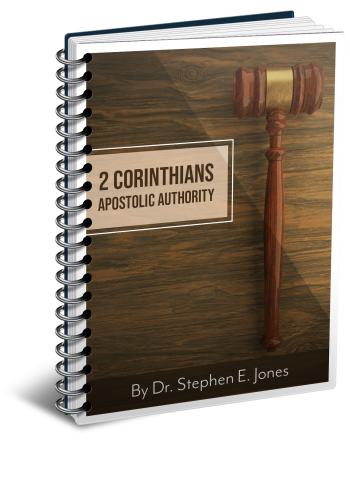Latest Posts
View the latest posts in an easy-to-read list format, with filtering options.

An in-depth commentary/study on the second book of Corinthians
Category - Bible Commentaries

2 Corinthians 2:1-3 says,
1 But I determined this for my own sake, that I would not come to you in sorrow again. 2 For if I cause you sorrow, who then makes me glad but the one whom I made sorrowful? 3 And this is the very thing I wrote you, lest, when I came, I should have sorrow from those who ought to make me rejoice; having confidence in you all, that my joy would be the joy of you all.
Here Paul turns his attention to those that he had reprimanded in his first epistle. Such corrections are difficult for anyone, for it seems that few are able and willing to be corrected. It seems that the church was still struggling with differing opinions, although apparently the church had firmly rendered a judicial decision against the man who had been living in incest.
Yet the differences of opinion were more difficult to resolve. It seems that the church still struggled with the disunity caused by those differences. Paul was reluctant to visit the church under those conditions. He had the authority to make an apostolic ruling that in essence would force his own opinion upon them, but as Ben Franklin once said, a man convinced against his will is of the same opinion still. Such rulings do not bring a state of joy, but a state of fear and sorrow.
Paul felt badly that his first letter had been only partially successful in reuniting the church. He had been very firm in his ruling against incest (1 Cor. 5:5-7, 13). The hearing took place, and the majority ruling in the church ruled against the man in question. Yet controversy lingered. It appears that the incestuous man had enjoyed some prominence in the church and was not without support.
At first glance, it seems that this issue was a simple case of incest with one’s mother. But if so, how could he convince anyone else of the justness of his case? It seems that the only way to claim any moral position is if the “mother” were actually a step-mother. At least in such a case the man could claim that there was no direct blood relationship between them, thereby claiming justification.
In those days, many of these wives were quite young and could even be younger than a man’s own children. It is plausible, then, that a man had died, leaving his young (second) wife alone in a house where her stepson was near her own age. They may have fallen in love, and this could well be the origin of the problem of incest. Without a doubt, the affection between the two young people was genuine, and they probably argued that when the man’s father died, she was free to marry whom she would, including the son, who was not directly related by blood to her.
But Paul’s Hebrew mindset would have none of it, for that was never a proper argument in interpreting Lev. 18:8. I suspect, then, that the difference between the Hebrew and Greek ways of viewing the law was at the bottom of this controversy.
Since this was obviously a legal question, it should be pointed out that it is not likely that anyone was claiming to put away the law in this situation. In other words, the incestuous couple could not argue that the law had been set aside in favor of “love.” We are not told how they defended their position, but if they claimed that “love” had superseded the law of Lev. 18:8, neither Paul nor the elders nor the majority in the church agreed with that assertion.
The problem was that some still disagreed and were grumbling.
2 Corinthians 2:4, 5 continues,
4 For out of much affliction and anguish of heart I wrote to you with many tears; not that you should be made sorrowful, but that you might know the love which I have especially for you. 5 But if any has caused sorrow, he has caused sorrow not to me, but in some degree—in order not to say too much—to all of you.
The sorrow of correction was preceded by the sorrow that was caused earlier by those who deviated from the truth or who strayed from the moral path of Scripture. But once again we are hampered by a lack of specific information, because Paul did not want to “say too much” about it. Paul knew that his letters would be read among the churches, so he was careful not to expose his opponent(s) in public.
2 Corinthians 2:6-8 concludes,
6 Sufficient for such a one is this punishment which was inflicted by the majority, 7 so that on the contrary you should rather forgive and comfort him, lest somehow such a one be overwhelmed by excessive sorrow. 8 Wherefore I urge you to reaffirm your love for him.
The “majority” among the panel of judges had sided with Paul’s understanding of the law and had ruled against the incestuous man. Paul then advocates forgiveness, not desiring the man to “be overwhelmed by excessive sorrow” (or too much punishment). This suggests that the man had complied with the ruling of the church court.
Paul wanted them to be able to put the incident into the past, so that they could all move on into the things of God. Yet the continued disagreement and hard feelings seem to indicate that not everyone had agreed upon the interpretation and application of the law of incest.
2 Corinthians 2:9-11 says,
9 For to this end also I wrote that I might put you to the test, whether you are obedient in all things. 10 But whom you forgive anything, I forgive also; for indeed what I have forgiven, if I have forgiven anything, I did it for your sakes in the presence of Christ, 11 in order that no advantage be taken of us by Satan; for we are not ignorant of his schemes.
In any church discipline, forgiveness ought to be the goal of all judgment, for that is the spirit and purpose of the law. Paul implies that he wanted the church itself to handle this case by itself as a “test” of their obedience in all things. Recall that Paul had chided them for not rising to the occasion at first (1 Cor. 6:5). But after reading Paul’s letter, the church did rise to the occasion and appoint a panel of judges.
Now that the trial had been completed and the judgment rendered, Paul supported their decision. The next step was to restore the sinner and to find a way to bring forgiveness to him. Even the seeming harshness of Paul’s earlier instruction had reflected the law’s merciful purpose, for Paul said in 1 Cor. 5:5,
5 I have decided to deliver such a one to Satan for the destruction of his flesh, that his spirit may be saved in the day of the Lord Jesus.
In other words, the purpose of judgment was not to consign the person to eternal separation from God, but to destroy the flesh and save the man in the end. So after the judgment was rendered, Paul’s concern turned toward restoration and forgiveness “in order that no advantage be taken of us by Satan.”
As an apostle, Paul acted as an Appeals Court justice, accepting the judicial decision of the church court and also their forgiveness of the sinner. In other words, the church had no need to fear that their forgiveness was unacceptable to Paul, in view of his judicial recommendations in his previous letter.
This ends the most pressing issue of the letter, tying up the loose ends from the moral controversy raised in the first letter.